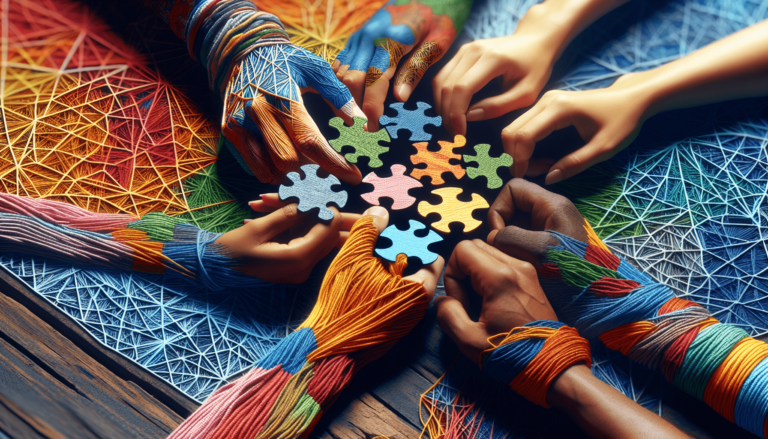The Ripple Effect Of Kindness In Daily Life
Imagine a world where small acts of kindness have the power to transform lives, creating a ripple effect that spreads joy and positivity throughout our daily interactions. In this article, we explore the incredible impact that simple acts of kindness can have, highlighting how a genuine smile, a helping hand, or a thoughtful gesture can make a lasting difference in both our own lives and the lives of others. Get ready to be inspired and discover the ripple effect of kindness in daily life.

Changing Perspectives
Empathy and Understanding
Having empathy and understanding for others is the first step in changing perspectives and cultivating a culture of kindness. When you put yourself in someone else’s shoes, you are better able to understand their feelings, experiences, and challenges. This enables you to respond to their needs with compassion and offer support. By practicing empathy and understanding, you can break down barriers between individuals and foster a sense of unity and connection within your community.
Breaking Down Barriers
Kindness has the power to break down barriers that separate people. It allows us to see beyond our differences and recognize our shared humanity. When we approach others with kindness, regardless of their background or beliefs, we create an inclusive environment where everyone feels valued and accepted. By putting aside our preconceived notions and embracing kindness, we can bridge divides and build a stronger, more harmonious society.
Creating a Positive Environment
Kindness has the ability to transform the environment around us. When we choose to be kind, we create a positive atmosphere that uplifts those around us. Simple acts of kindness, such as a smile, a compliment, or a helping hand, can brighten someone’s day and create a ripple effect of positivity. By fostering a positive environment through acts of kindness, we inspire others to do the same and create a culture where kindness is the norm.
Improving Relationships
Enhancing Communication
Kindness plays a crucial role in enhancing communication and fostering healthy relationships. When we approach conversations with kindness, we are more likely to listen attentively, understand others’ perspectives, and respond with empathy. By practicing kindness in our interactions, we create an environment of trust and openness, allowing for honest and effective communication. This leads to stronger relationships built on mutual respect and understanding.
Fostering Trust and Connection
Kindness is the key to fostering trust and connection in relationships. When we consistently demonstrate kindness, we create a safe space where people feel comfortable expressing themselves and sharing their thoughts and feelings. This fosters a deep sense of connection and strengthens the bonds between individuals. Trust is essential for any relationship to thrive, and kindness acts as a foundation for building and maintaining that trust.
Resolving Conflict
Conflict is inevitable in any relationship, but kindness can be a powerful tool in resolving conflicts peacefully. By approaching conflicts with kindness and empathy, we can defuse tension, promote understanding, and find common ground. Kindness helps us to see the humanity in others and encourages us to seek resolution rather than escalating the conflict. Through acts of kindness and understanding, we can overcome differences, find compromises, and strengthen our relationships.
Boosting Mental and Emotional Well-being
Reducing Stress and Anxiety
Kindness has a direct impact on our mental and emotional well-being. When we engage in acts of kindness, such as helping others or expressing gratitude, it activates the reward centers in our brains, releasing feel-good hormones like dopamine and oxytocin. This can help reduce stress and anxiety, promoting a sense of calm and well-being.
Promoting Positivity and Happiness
Kindness has the power to promote positivity and happiness both in ourselves and in others. When we choose to be kind, we focus on the positive aspects of life and spread joy to those around us. Acts of kindness not only bring happiness to the recipients but also give us a sense of fulfillment and purpose. By cultivating a habit of kindness, we can create a ripple effect of positivity and happiness in our daily lives.
Enhancing Self-worth and Confidence
Practicing and receiving kindness can enhance our self-worth and confidence. When we experience acts of kindness from others, it reinforces our belief in our own value and worthiness. On the other hand, when we extend kindness to others, it boosts our self-esteem and gives us a sense of meaning and accomplishment. Kindness reminds us of our inherent goodness and contributes to our overall sense of self-worth and confidence.
Encouraging Random Acts of Kindness
Spreading Joy and Happiness
Random acts of kindness have the power to spread joy and happiness far and wide. Whether it’s buying a coffee for the person in line behind you, leaving a kind note for a stranger, or performing a small act of service, these gestures have the potential to brighten someone’s day and create a lasting impact. By encouraging and engaging in random acts of kindness, we contribute to a more compassionate and joyful world.
Inspiring Others to Pay It Forward
One of the remarkable aspects of kindness is its ability to inspire others to pay it forward. When someone experiences an act of kindness, they are more likely to feel motivated to do something kind for someone else. This creates a chain reaction of kindness, with each act inspiring another. By initiating and promoting random acts of kindness, we can create a positive cycle that extends beyond ourselves and influences the behavior of others.
Creating a Chain Reaction
Kindness has an incredible ripple effect, spreading from person to person and creating a chain reaction of positivity and compassion. When you perform an act of kindness, it touches not only the recipient but also those who witness it. These observers are then more likely to engage in acts of kindness themselves, which can inspire others in turn. By consciously choosing kindness and encouraging others to do the same, we can create a powerful chain reaction of kindness that transforms communities.

Building a Stronger Community
Promoting Cooperation and Collaboration
Kindness is essential for promoting cooperation and collaboration within communities. When individuals approach one another with kindness, it fosters an environment of trust and openness, enabling cooperation and collaboration to flourish. Kindness breaks down barriers and encourages people to work together towards common goals, building stronger and more resilient communities.
Supporting Those in Need
Kindness allows us to support those in need within our community. By recognizing and responding to the needs of others, we create a culture of caring and compassion. Acts of kindness, such as volunteering, donating, or offering assistance, can provide crucial support to individuals facing difficulties. By extending kindness to those in need, we create a stronger and more compassionate community that takes care of its members.
Creating a Supportive Network
Kindness creates a supportive network where individuals feel valued and supported. By showing kindness to others, we build connections and create a sense of belonging. This support network becomes a source of emotional and practical assistance, impacting the well-being of individuals within the community. When we prioritize kindness, we create a community that looks out for one another and supports each other in times of need.
Fueling Personal Growth
Increasing Self-awareness
Practicing kindness requires self-awareness and reflection. When we engage in acts of kindness, we become more attuned to our thoughts, emotions, and behavior. This self-awareness allows us to identify areas for growth and personal development. Kindness serves as a mirror, reflecting our own values and highlighting areas where we can further cultivate empathy, compassion, and understanding.
Cultivating Empathy and Compassion
Kindness is closely linked to empathy and compassion. When we engage in acts of kindness, we tap into our capacity for understanding and relating to others’ experiences. Kindness helps us cultivate empathy by encouraging us to step outside of our own perspectives and truly listen and respond to the needs of others. By practicing empathy and compassion, we deepen our connection with others and nurture our own personal growth.
Expanding Worldviews
Kindness has the power to expand our worldviews and challenge our preconceived notions. When we approach others with kindness, we acknowledge their unique perspectives and experiences. This allows us to broaden our understanding of the world and challenge any biases we may hold. Kindness encourages us to embrace diversity and actively seek out new perspectives, ultimately contributing to our personal growth and development.
Enhancing Physical Health
Boosting Immune Function
Acts of kindness have been shown to have a positive impact on our physical health, particularly by boosting immune function. Research has found that engaging in acts of kindness increases the production of antibodies and enhances immune system functioning. By incorporating kindness into our daily lives, we can support our immune system and promote overall physical well-being.
Lowering Blood Pressure
Kindness has also been linked to lower blood pressure. When we engage in acts of kindness, our bodies release oxytocin, a hormone that helps to lower stress levels. Lowering stress has a positive effect on blood pressure, reducing the risk of hypertension and cardiovascular disease. By practicing kindness, we can actively contribute to maintaining healthy blood pressure levels and improving our physical health.
Improving Heart Health
Acts of kindness have an impact on our heart health. Studies have shown that engaging in acts of kindness activates the vagus nerve, which is responsible for regulating heart rate and lowering blood pressure. This activation leads to improved heart health, reducing the risk of heart disease and promoting overall cardiovascular well-being. By practicing kindness, we can actively promote the health of our hearts and protect against heart-related conditions.
Creating a Culture of Kindness
Promoting Social Responsibility
Creating a culture of kindness requires promoting social responsibility. When individuals prioritize kindness, they take responsibility for their actions and the impact they have on others. By encouraging social responsibility, we cultivate a sense of accountability and a commitment to treating others with kindness and respect. This ultimately creates a culture where kindness is upheld as a core value and guides individuals’ behaviors and interactions.
Instilling Kindness as a Value
Kindness can be instilled as a core value within communities and organizations. By actively promoting the importance of kindness, we create a shared understanding and commitment to treating others with compassion and empathy. Instilling kindness as a value requires education, communication, and consistent reinforcement of its importance. By integrating kindness into our collective value system, we build a foundation for a culture of kindness that permeates every aspect of our lives.
Celebrating Acts of Kindness
A culture of kindness thrives on recognition and celebration of acts of kindness. When we celebrate and acknowledge kindness, we reinforce its importance and inspire others to engage in kind acts. By highlighting and sharing stories of kindness, we create a positive narrative that encourages more individuals to embrace kindness in their daily lives. Celebrating acts of kindness also fosters a sense of unity and community, creating a supportive environment that celebrates and uplifts everyone.
Combatting Negativity
Counteracting Bullying and Cyberbullying
Kindness is a powerful antidote to negativity, particularly in the context of bullying and cyberbullying. By promoting kindness, empathy, and respect, we can counteract the harmful effects of bullying. Kindness creates an environment where bullying is less likely to occur, as individuals who prioritize kindness are less likely to engage in hurtful behavior. By actively combatting negativity through kindness, we can create a safe and inclusive environment for all.
Resisting Prejudice and Discrimination
Kindness serves as a powerful tool in resisting prejudice and discrimination. When we approach others with kindness, we actively challenge stereotypes and biases. Kindness enables us to see beyond superficial differences and appreciate the unique value and worth of each individual. By resisting prejudice and discrimination through acts of kindness, we create a society that is more inclusive, equitable, and compassionate.
Overcoming Social Isolation
Kindness plays a significant role in combatting social isolation. Acts of kindness, such as reaching out to those who may be lonely or providing support to vulnerable individuals, create connections and foster a sense of belonging. By extending kindness to those who may be isolated, we can reduce feelings of loneliness and build a more inclusive and supportive community. Through acts of kindness, we can break the cycle of social isolation and create a sense of togetherness.
Influencing Future Generations
Teaching Empathy and Kindness
Empathy and kindness can be taught to future generations, shaping a better world. By incorporating empathy and kindness into educational curriculum and parenting practices, we can instill these values from an early age. Teaching empathy and kindness helps children develop a deep understanding of others’ emotions and experiences, encouraging them to respond with kindness and compassion. By guiding future generations to prioritize empathy and kindness, we can create a more empathetic and compassionate world.
Modeling Positive Behavior
Modeling positive behavior is crucial in influencing future generations. Children learn by observing the behavior of those around them, so leading by example is essential. By consistently demonstrating kindness and empathy in our own actions, we provide a blueprint for future generations to follow. Modeling positive behavior not only impacts the individuals directly influenced but can also inspire others to emulate the kindness they witness, creating a ripple effect that extends through generations.
Shaping a Better World
By prioritizing kindness and advocating for its importance, we can collectively shape a better world. Each act of kindness, no matter how small, contributes to the larger goal of creating a world that values compassion, empathy, and understanding. By raising awareness, engaging in acts of kindness, and promoting kindness as a fundamental value, we play a part in building a future where kindness is the driving force behind positive change. Together, we can shape a world where kindness is celebrated and woven into the fabric of society.
In conclusion, kindness has the power to transform our lives and the world around us. By practicing empathy and understanding, enhancing relationships, and fostering a positive environment, we can create a ripple effect of kindness that impacts individuals and communities. Kindness boosts our mental and emotional well-being, encourages random acts of kindness, and builds stronger communities. It fuels personal growth, enhances physical health, and creates a culture of kindness that counteracts negativity. By influencing future generations and shaping a better world, kindness becomes the catalyst for positive change. Let us embrace kindness as a way of life and celebrate its extraordinary impact on our daily lives and the world we share.







